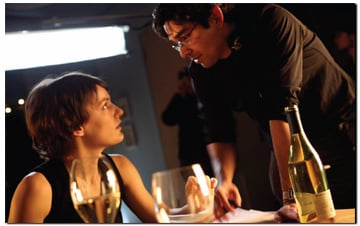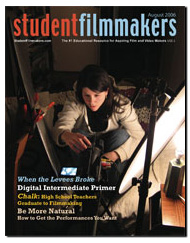Check out this
article in the print edition of StudentFilmmakers
Magazine, August
2006. More photos in the print version, including
production stills, scenes from the film, and storyboard sketches.
Subscribe
to the Magazine Today!
Interview with Director Phillip Van
The Making of "High Maintenance"
...
Continued from Preview Page
Was there a particular scene that was most challenging to
light?
Yes, definitely. There�s a reveal that a character is not human,
and it involves a very small and peculiar implant built into a
part of his body. We shot it with macro lenses. We had to underexpose
it a bit, and we had to hide some of the flaws, in make-up and
prosthetics, with the light, which can be tricky.

Phil and Nicolette work on an intense moment on the set of
"High Maintenance."
Photo by James Nicholls.
Did any challenges come up during post production?
The first cuts of most films are generally not so great, even
when the films themselves are. There are always pacing issues
and a lot of rough edges. Stopping at a first cut of a film is
like deciding to go into production with the rough draft of a
script. We knew that we had to get past a first cut in a very
short amount of time in order to get the film tight enough to
do justice to the great material and performances we shot. The
challenge was essentially that we had to get to a legitimate third
or fourth cut of the film in roughly twenty hours, with no time
to step away, gain perspective and reapproach the material.
We had to streamline the whole process, and my wonderful editor,
Dorothee Brockelmann and I used a technique that I just call �over-cutting.�
I came up with it while editing directing exercises at NYU overnight.
In a typical editing process, you can shape and refine a film
over time, whittling down a longer version of it until you get
to an acceptable length and pace. Instead of lavishing my film
with pauses, beats and �precious� between characters, I make a
note of them on paper, then basically just cut them out. It sounds
destructive, and it is, but only at first. After you �over-cut�
the film it ends up being too short, lacking a definable pace,
and somewhat difficult to understand. When you hit this point,
you start to re-insert the pauses. The act of adding time decisively,
rather than taking it away slowly, makes you extremely conscious
of what a pause or a breath is doing in your film.
Do you think it�s important for filmmakers to enter film contests
and festivals?
Yes, definitely. Competitions and festivals get your work out
there to an audience or a committee that can evaluate it. Filmmaking
doesn�t end with a final cut. Audience reception is a part of
the experience. You want to see how your material plays among
those that are not you, not your friends, and not a hermetically
sealed group of people.
Watching my films in different regions of the country or in entirely
different cultures is always an eye-opening experience. Often,
moments that you just know work actually work universally, across
cultural divides. Others don�t. Screening a film you made in a
different part of the world is one of the most fascinating possible
types of communication with other cultures.
So yeah, get your stuff out there, and get the feedback of creative
communities in your country or from around the world because you�ll
come to know yourself more as a result of it. As a filmmaker and
as a person, you�ll get a better understanding of your own tastes,
inclinations and motives and how they resist and define different
parts of your own culture.
How important is it for students to gain industry experience
while pursuing their undergraduate and graduate degrees?
It can sometimes be difficult to time-manage, but for me, it was
critical. As a graduate student at NYU it has been fairly easy
to interact and work within the industry in New York and attend
the program because of proximity. But as an undergrad initially
getting into film at Cornell, in upstate New York, the isolated,
self-enclosed environment made things difficult. I needed a way
out. I needed to experience what the industry was, or at least,
what New York City was, if nothing else.
How has film school helped you?
It has done a lot of good. The main thing I took from film school
is probably simpler than I would have thought going in. The program
really taught me how to work with other people, not that I didn�t
know how to beforehand, but I mean every type of person imaginable.
Continued
on Next Page...
|

